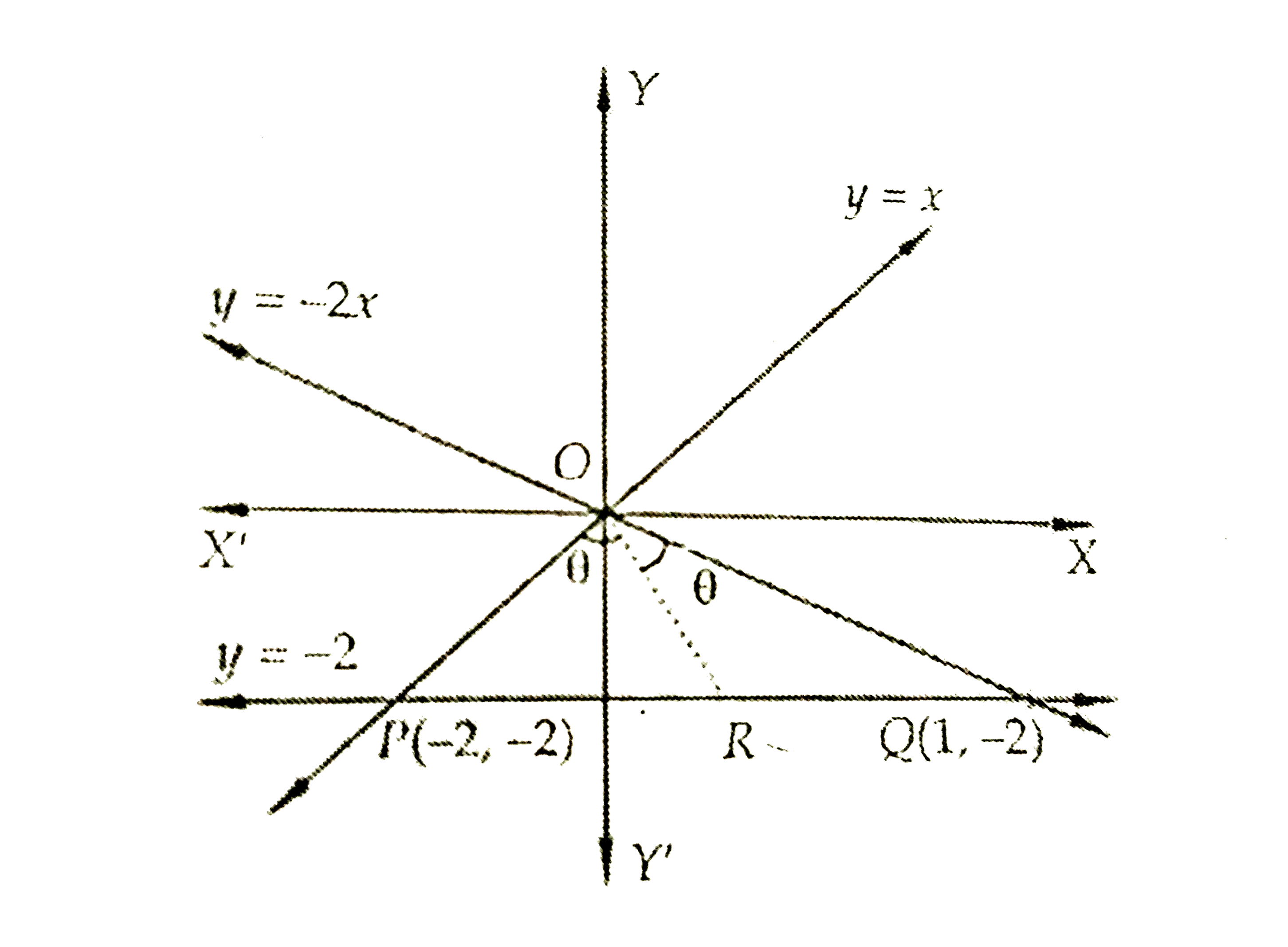The lines L1:y−x=0 and L2:2x+y=0 intersect the line L3:y+2=0 at P and Q respectively . The bisectors of the acute angle between L1 and L2 intersect L3 at R .
Statement 1 : The ratio PR : RQ equals 2√2:√5
Statement - 2 : In any triangle , bisector of an angle divides the triangle into two similar triangles .
Statement -1 is True , Statement - 2 is true , Statement- 2 is a correct explanation for statement - 13
Statement-1 is True , Statement-2 is True , Statement -2 is not a correct explanation for Statement - 1 .
Statement-1 is True , Statement - 2 is False .
Statement - 1 is False , Statement -2 is True .
The correct Answer is:C
Statement-2 is not true
In ΔOPQ , OR is the bisector of ∠POQ .
∴OPOQ=PRRQ
⎡⎢⎣∵Bisector of an angle dividesopposite side in the ratio of the sides containing the angle ⎤⎥⎦
⇒PRRQ=2√25
So , statement - 1 is true .

Topper's Solved these Questions
- STRAIGHT LINESBOOK - OBJECTIVE RD SHARMACHAPTER - STRAIGHT LINESEXERCISE - SECTION - II (ASSERTION - REASON TYPE MCQs
1 Videos
- STRAIGHT LINESBOOK - OBJECTIVE RD SHARMACHAPTER - STRAIGHT LINESEXERCISE - Exercise
130 Videos
- STRAIGHT LINESBOOK - OBJECTIVE RD SHARMACHAPTER - STRAIGHT LINESEXERCISE - Section-1 Solved MCQs (Example)
1 Videos
- SETSBOOK - OBJECTIVE RD SHARMACHAPTER - SETSEXERCISE - Chapter Test
30 Videos
Similar Questions
The lines L1:y−x=0 and L2:2x+y=0 intersect the line L3:y+2=0 at P and Q respectively . The bisectors of the acute angle between L1 and L2 intersect L3 at R .
Statement 1 : The ratio PR : RQ equals 2√2:√5
Statement - 2 : In any triangle , bisector of an angle divides the triangle into two similar triangles .
View SolutionThe lines L1:y−x=0 and L2:2x+y=0 intersect the line L3:y+2=0 at P and Q respectively . The bisectors of the acute angle between L1 and L2 intersect L3 at R .
Statement 1 : The ratio PR : RQ equals 2√2:√5
Statement - 2 : In any triangle , bisector of an angle divides the triangle into two similar triangles .
View Solution
Knowledge Check
The lines L1:y−x=0 and L2:2x+y=0 intersect the line L3:y+2=0 at P and Q, respectively. The bisector of the acute angle between L1 and L2 intersects L3 at R.
Statement 1 : The ratio PR : RQ equals 2√2:√5.
Statement 2: In any triangle, bisector of an angle divides the triangle into two similar triangles.1AStatement 1 is true, statement 2 is false.BStatement 1 is true, statement 2 is true, statement 2 is the correct explanation of statement1.CStatement 1 is true, statement 2 is true, statement 2 is not the correct explanation of statement 1.DStatement 1 is false, statement 2 is true.Lines L1:y−c=0 and L2:2x+y=0 intersect the line L3:y+2=0 at P and Q respectively. The bisector of the acute angle between L1 and L2 intersects L3 at R.
Statement I The ratio PR:RQ equals 2√2:√5.
Because
Statement II In any triangle, bisector of an angle divides the triangle into two similar triangles.AStatement I is true, Statement II is also true, Statement II is correct explanation of Statement IBStatement I is true, Statement II is also true, Statement II is not the correct explanation of Statement ICStatement I is true , Statement II is falseDStatement I is false , Statement II is true
The straight lines L=x+y+1=0andL1=x+2y+3=0 are intersecting,'m' is the Slope of the straight line L2 such that L is the bisector of the angle between L1andL2 . The value of m2 is
View SolutionFor the lines L1:3x−2y+5=0andL2:kx+by–15=0 L1 is perpendicular to L2 if k=4.
View SolutionIf L=2y−x=0 and if the acute angular bisector of L=0 and x-axis is L1=0 and the acute angular bisector of L=0andy− axis is L2=0 then theangle between L1=0andL2=0 is...
View Solutionthe lines L1 and L2 denoted by 3x2+10xy+8y2+14x+22y+15=0 intersect at the point P and have gradients M1 and M2 respectively.The acute angles between them is θ . which of the following relations hold good ?
View Solutionif line 2x+7y−1=0 intersect the lines L1:3x+4y+1=0andL2:6x+8y−3=0 in AandB respectively, then equation of line parallal to L1andL2 and passes through a point P such that AP:PB=2:1 (internally) is (P is on the line 2x+7y−1=0)
View SolutionLet a line L1:3x+2y−6=0 intersect the x and y axes at P and Q respectively. Let another line L2 perpendicular to L1 cut the x and y axes at R and S respectively.The locus of point of intersection of the lines PS and QR is
View Solution
